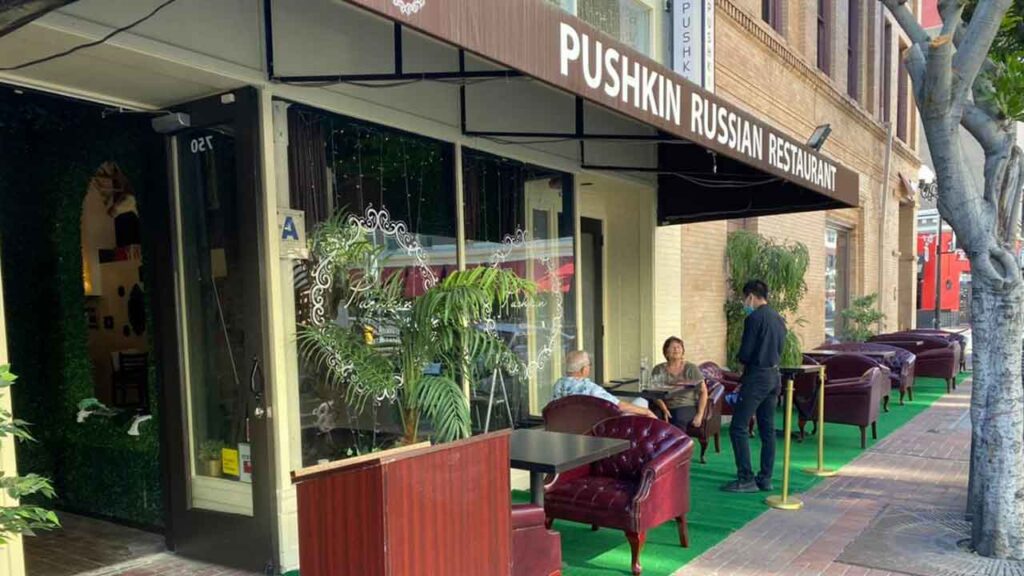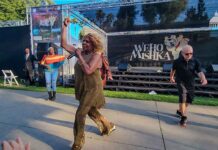SACRAMENTO, Ca. – “I have a question; Why should the Russian-speaking population of Sacramento take part in Slavic Sacramento?” That was the start of a recent post left on the Facebook group of the digital news site Slavic Sacramento.
The comment reflects the simmering tensions fueled by Russia’s invasion of Ukraine in 2022 here in one of the US’s largest Slavic enclaves.
“The Slavs are the Poles, Slovaks, Belarusians, Ukrainians! Are we forced to learn Russian here,” the post continued. “Why should the language of the aggressor unite real Slavs today?”
The term Slavic covers a broad swath of cultures – including Russians – across what was once the Soviet Union, where Russian served as the lingua franca connecting otherwise disparate groups with distinct languages and identities. The arrival of emigres from the USSR starting in the 1980s led to the growth of the Slavic community in Sacramento, a growth that continued after the fall of the Soviet Union in 1989.
With the war in Ukraine an additional 270,000 emigres arrived in the US, most of them refugees from Ukraine, settling in communities like Sacramento which, according to the US Census Bureau, is home to over 6,000 immigrants from Russia and 18,000 immigrants from Ukraine. Around 30,000 residents speak Russian as a first language, while some 16,000 speak “Ukrainian or another Slavic language.”
As the fighting grinds on, with Russian aerial bombardments laying waste to Ukrainian cities and cultural monuments, the divisions are widening, with calls for an outright ban on the Russian language in Ukraine’s capital, Kiev finding echoes again here in California.
A heated discussion followed the original Facebook post, which was in Ukrainian. Comments alternated between celebrating the statement, some referring to Russian as the language of the “occupier” while others accused the original commenter of discrimination and “racism.”
“Here in California, Russian is not the language of the aggressor,” read one of many responses. “Belarusians, Moldavians, Gagauz, as well as many Poles, Romanians, Bulgarians, Serbs, and even Mongols” speak Russian. In communities farther north, the commenter continued, Russian has remained the primary language for generations.
And in fact, not all are divided on the question of Russia’s invasion. The Voices of Russian Opposition in Sacramento is a group of Russian-born activists opposed to the war and critical of Moscow’s actions.
“I am very blessed to have a lot of friends, a lot of Russian friends, here who think the same way I do, who also do whatever they can to help Ukraine win, and we will keep doing that,” lead organizer Anna Berbeneva told a local broadcaster.
Russian born Sergey Terebkov is the founder of the Slavic-American Chamber of Commerce in Sacramento. He says he hasn’t seen any issues between Russian and Ukrainian speakers in the community, though a recent fight between a group of young Russians and Ukrainians in July suggests otherwise.
Then there was the clash between neighbors in Washington state, where a Russian home in a suburban community outside Seattle displayed messages in support of Moscow’s war effort, with signs touting the notorious Wagner mercenary group painted across the garage door. The home was attacked on several occasions by Ukrainian emigres who also threatened to destroy the homeowner’s business.
Slavic Sacramento received an audio recording of one local resident’s contact with the police, requesting an officer to “deal with the situation.” The caller was worried and expressed concern that tensions in the community would not subside as long as the statement continued to disturb neighbors.
“You can peacefully protest. However, according to the Constitution, this owner has the right to express his own opinion,” the dispatcher responded.
“You are fascists! You don’t belong in America! Leave for Russia!” were some of the insults hurled by indignant neighbors during one encounter. The home was later vandalized, the garage door spray painted yellow and blue – the colors of Ukraine – while a family Volkswagen was dented, the wheels punctured, and paint poured over it.
The occupants now live “in fear, as the crowd of masked men threatening them has reached twenty to thirty people,” a police report stated.
Before retiring earlier this year as head of the Center for the Study of Hate and Extremism at California State San Bernardino, Brian Levin spent three decades studying the rise of hate groups in this country. On a recent briefing, he noted a strong correlation between international events such as the war in Ukraine as well as the more recent Israeli Palestinian conflict and increases in inter-ethnic hate.
Citing the latest FBI data, Levin noted the overall upward trend in hate crimes, which climbed 6.9% in 2022. He also pointed to spikes in the number of hate crimes that followed events including 9/11 and the killing of George Floyd.
“Hate crimes are not only spiking, but are more elongated in in their spikes,” said Levin, adding, “There is massive underreporting” among “immigrant and foreign-language communities.”
The California Department of Justice has issued hate crime brochures with information on how to identify and report hate crimes and the services available to victims of hate crimes in twenty-four languages, including Russian, Ukrainian, and Armenian.
It is noteworthy that recently in California, there is a government program called Stop the Hate, the main goal of which is to assist victims of hate attacks and prevent them. All victims and witnesses of hate incidents and hate crimes can report and are eligible for free hotline support services. California vs Hate is not affiliated with law enforcement, and you can report anonymously.
Any victim of or witness to a hate incident or crime in California can report it and receive support any time using the link above. You can also call 833-8-NO-HATE; (833) 866-4283 Monday – Friday from 9:00 am – 6:00 pm. If outside of those hours, you can leave a voicemail, or you can call 211 to report hate and seek support.
You can currently submit reports online in 15 languages and, when calling the hotline, you can get access to support in over 200 languages. If you want to report a hate crime to law enforcement immediately or you are in present danger, please call 91
Ruslan Gurzhiy, Slavic Sacramento
This article published with support from Ethnic Media Services





